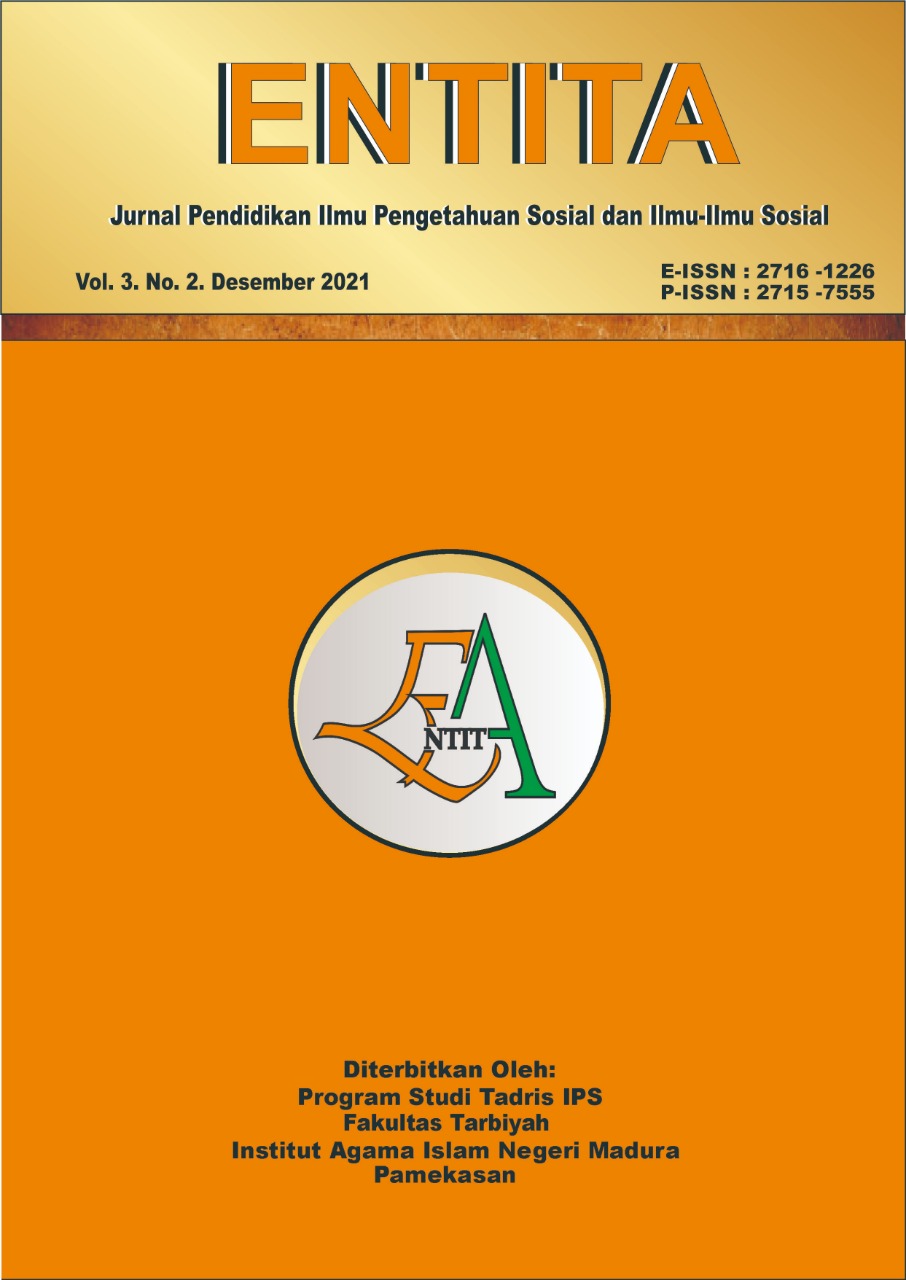Nilai-Nilai dalam Permainan Tradisional Banjar “Ba-u-upauan” sebagai Sumber Belajar Ilmu Pengetahuan Sosial
 Abstract views: 376
,
Abstract views: 376
,
 PDF downloads: 514
PDF downloads: 514
Abstract
The success of education makes students better than before. The determining factor in the success of education is supported by the personality of the students. Personality is obtained by character values that are instilled through the learning process. Through this learning resource, the traditional game "Ba-u-upauan" is considered capable of shaping the personality and fostering positive values of students. The aims of this research are (1) the traditional Banjar game "Ba-u-upauan" (2) the values of the traditional game "Ba-u-upauan" as a learning resource for Social Sciences. This research uses descriptive qualitative research. The research subjects were the Principal, vice principal, Teachers and students. Data collection techniques were carried out through observation, interviews and documentation. The data analysis uses qualitative analysts. The result of the research is to describe the traditional Banjarese game "Ba-u-upauan" with the stages of the game starting with preparation, process and closing. The traditional Banjar game "Ba-u-upauan" has independence and togetherness which eventually raises character values, namely honest values, religious values, responsibility values, cooperation values, curiosity values, hard work values, democratic values, communicative values and love values. peace that can be used as a reference in Social Science learning resources at the elementary school level.
Downloads
References
Melisa Prawitasari. “ETHNOPEDAGOGY : Nilai-NIlai Permainan Masyarakat Banjar.” Banjarmasin, November 14, 2015.
Nadziroh, Chairiyah, and Wachid Pratomo. “NILAI-NILAI KARAKTER DALAM PERMAINAN TRADISIONAL.” Trihayu : Jurnal Pendidikan Ke-SD-An 5 (Mei 2019): 661–66.
Nani Solihati, Ade Hikmat, Abdul Rahman Jupri, and Syarif Hidayatullah. “NILAI PENDIDIKAN KARAKTER DALAM PERMAINAN RAKYAT DI LERENG GUNUNG MERAPI.” Jurnal Pendidikan 3 (Mei 2019): 28–42.
“NILAI-NILAI PENDIDIKAN BERBASIS KARAKTER PADA PENDIDIKAN DASAR DAN MENENGAH,” n.d.
Supriadi. “PEMANFAATAN SUMBER BELAJAR DALAM PROSES PEMBELAJARAN.” Lantanida Journal 3 (2015).
Susanto, Ahmad. Pengembangan Pembelajaran IPS Di Sekolah Dasar. Jakarta, 2014.
Syamsul Anam, Geby Ovaleoshanta, Fahriza Ardiansyah, and Danang Ari Santoso. “STUDI ANALISIS BUDAYA PERMAINAN TRADISIONAL SUKU OSING KABUPATEN BANYUWANGI.” Jurnal Pembelajaran Olahraga, 2, 3 (2017). http://ojs.unpkediri.ac.id/index.php/pjk/index.
Warmansyah Abbas, Ersis. Mewacanakan Pendidikan IPS. Bandung: Wahana Jaya Abadi, 2014.
Zainal Arifin. Penelitian Pendidikan Metode Dan Paradigma Baru. Bandung: PT. Remaja Rosdakarya, 2012.
Copyright (c) 2021 Noor Hidayati

This work is licensed under a Creative Commons Attribution-NonCommercial 4.0 International License.
ENTITA: Jurnal Pendidikan Ilmu Pengetahuan Sosial dan Ilmu-Ilmu Sosial operates an Open Access policy under a Creative Commons Non-Commercial 4.0 International license. Authors who publish with this journal agree to the following terms:
- The copyright of the received article once accepted for publication shall be assigned to the journal as the publisher with licensed under a

- Journal is able to enter into separate, additional contractual arrangements for the non-exclusive distribution of the journal's published version of the work (e.g., post it to an institutional repository or publish it in a book), with an acknowledgement of its initial publication in this journal.
- Journal is permitted and encouraged to post their work online (e.g., in institutional repositories or on their website) prior to and during the submission process, as it can lead to productive exchanges, as well as earlier and greater citation of published work (see The Effect of Open Access).
- Here is Copyright Transfer Form that author can download and send to OJS during submission.

















